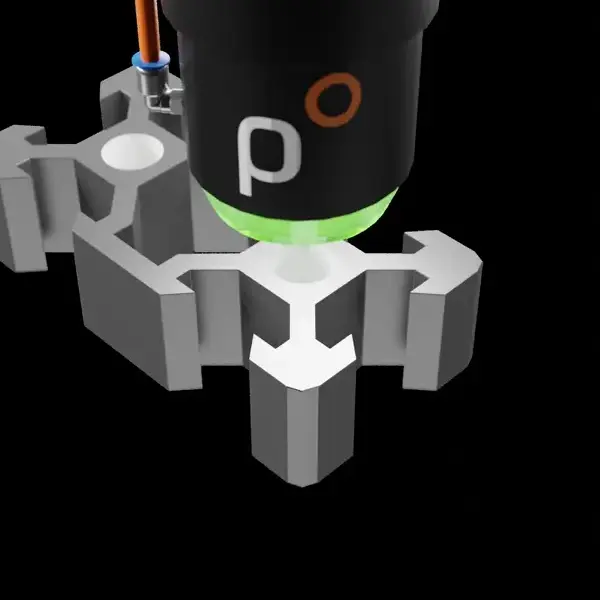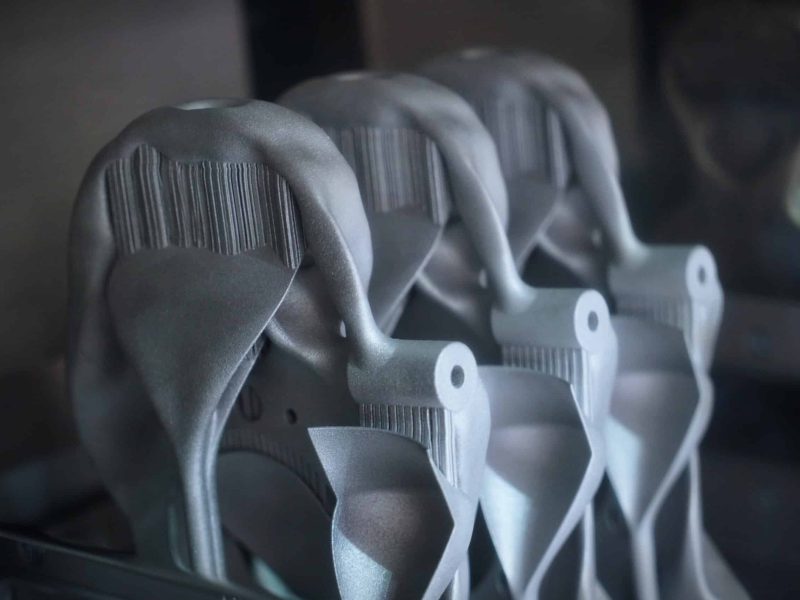Plasma polishing
Plasma polishing at a glance
Plasma polishing is the highly efficient and environmentally friendly alternative to electropolishing.
With the targeted combination of electrochemistry and plasma physics, plasma polishing sets a new standard in metal finishing. The unique active principle enables roughness of up to Ra 0.02 µm with almost complete shape retention, even on complex surfaces. These are simultaneously cleaned, polished, deburred and sterilized in environmentally friendly electrolytes within 20 to 200 seconds. As experts in plasma polishing, plasmotion has optimized the process for almost all relevant metal alloys and will be happy to advise you on your individual application.

Your expert for questions
- Sven Friedemann
- Technical sales
- Phone +49 3731 37736 - 31
Technology
With plasma polishing, you can achieve your desired surface quickly and reliably.
Clean, smooth, shiny and sterile in a single process step? With its unique operating principle, plasma polishing offers a highly efficient alternative to mechanical or electrochemical polishing. Without any significant thermal or mechanical influences, you can achieve your desired surface finish in around 20 to 200 seconds - even on complex workpieces. Not only can the roughness and appearance of the surface be adapted to your requirements, but tarnishing and discoloration can also be efficiently removed from welds, for example.
Is plasma polishing right for your components? We will be happy to advise you personally.
Minimum roughness
Plasma polishing achieves your target roughness of up to Ra 0.02 µm and largely preserves the initial geometry with minimal edge rounding. However, the desired edge radii can also be set through targeted process control.
Unrivaled brilliance
Our surfaces also impress where aesthetics are required. Plasma polishing offers a higher gloss than electropolishing and enables an even finish on a par with hand polishing.
Improved properties
Improve the feel, corrosion resistance and cleanability of your components with plasma polishing. The plasmotion finish meets even the highest requirements, e.g. in the medical technology and pharmaceutical industries.
Versatile
plasmotion has qualified the process for almost all industrially relevant alloys - from stainless steels to titanium, tool steels, copper, aluminum, brass, CoCr, precious metals, Invar, Nitinol, and many more.
Plasma polishing in action
High-quality surfaces - true to geometry and in seconds.
We realize our special process principle with our plasmotion system modules and our unique electrolytes. These are tailor-made for your material and your application.
Functionality
The unique active principle - perfected by plasmotion.
plasmotion° combines electrochemistry and plasma physics in one process.
The workpiece is processed in a bath of plasmotion's special electrolytes based on aqueous salt solutions. At a material-dependent DC voltage of 200 to 400 volts, a vapor plasma sheath is formed which flows around the surface.
Here, electrochemical and plasma-physical processes work hand in hand to remove burrs and micro-roughness in record time. The result: clean, smooth and shiny surfaces, even with highly complex contours.
EFFICIENT
Micro-roughness is leveled, impurities removed and burrs eliminated in a single step. In addition to short processing times, previously necessary pre-treatments, such as cleaning steps, can often be eliminated.
Sustainable
plasmotion achieves these results using special, proprietary electrolytes. The aqueous salt solutions with special active components are 100% harmless according to REACH, recyclable and ensure improved working conditions.

Gentle
The protective steam jacket keeps the component temperature in the processing area limited to 100°C. This enables the processing of delicate and heat-treated or surface-hardened parts without any loss of quality.
Reliable
By using optimized process parameters, fully automated technologies and material-specific electrolytes, plasmotion can guarantee the best results, even in large-scale production.
But how exactly does plasma polishing work?
For our process, we use an electrolyte solution adapted to your material and your requirements. This is always an aqueous salt solution which, unlike electrolytes from other technologies, is 100% harmless and recyclable. For processing, the respective workpiece is immersed individually or together with others in the bath of proprietary electrolytes. The specially adapted DC voltage creates a vapor plasma envelope that surrounds the surface of the workpiece. This also limits the surface temperature to around 100 °C. In contrast to mechanical processes, for example, even delicate components can be treated in this way. The plasma-electrolytic finishing process now takes place within a short time: even the smallest roughness, impurities and burrs are removed, leaving you with a smooth surface that impresses with its shine and cleanliness. What requires several steps with other techniques is possible in just one process with plasmotion. This reduces the process time of a workpiece by up to 80 %.
What is special about JETPEP?
Plasma polishing has its limits in the maximum component size and the required overall processing of the surface. However, if this is precisely what is required, manual polishing is often the only option. We have developed our JETPEP technology to finally open up the unique advantages of plasma polishing for large workpieces and surface-specific finishing. The electrolyte bath is bundled into a jet that is applied precisely to the desired areas of the workpiece. This gives you optimum results without compromise. Even deburring in particularly complex areas is possible.
How can I use these technologies?
You want optimum surface treatment for your components. That's why we offer you the option of contract manufacturing at plasmotion or the integration of production systems into your process chain on site. Our experts have developed optimum electrolytes for a diverse portfolio of metals. On this basis, you will receive process parameters tailored to your application and therefore always perfect results, even with in-house production. We will be happy to check together in a sampling session whether and in which variant our plasma polishing is the right one for your application.
Applications
Plasma polishing is convincing wherever quality and reliability count,
.
Due to its outstanding surface properties, plasma polishing has quickly proven itself as a solution, particularly in medical technology and plant engineering. The unique processing approach qualifies it for a wide range of applications, from delicate jewelry parts to precise machine components and complex welded assemblies.
plasmotion covers this range of applications with an extensive portfolio of services. See for yourself!
Take your production to the next level with plasma polishing solutions from plasmotion. We develop complete series systems or technology modules that can be used in a wide range of industries - from small part production in the medical sector to large series in the automotive industry.
You can see the strengths of our technologies for yourself by taking a sample first.
With our systems, we also offer you plasmotion's unique technology portfolio as contract manufacturing - reliable and high-quality from batch size 1 to series production. We impress with short delivery times and a wide range of components. This means that we often have suitable solutions for previously impossible applications.
You can see the strengths of our technologies for yourself by taking a sample first.
The magic of plasmotion lies in our electrolytes. Our sustainable salt water-based solutions are 100% harmless according to REACH, environmentally friendly and recyclable. With these, we have shortened process times, optimized processing results and extended service lives. For reliable plasma polishing results in your production, we provide you with the right electrolyte for your application as part of our full-service approach, including collection and preparation.
We support you with our expertise in 3D surface analysis and advise you on the optimum process chain for your desired surface.
PERFORMANCE
Plasma polishing can be seamlessly integrated into your production.
Replace inefficient and manual processes with plasma polishing - whether in contract manufacturing at plasmotion or with individual systems at your premises. We would be happy to present the advantages of our technologies to you in person - from individual part production to large-scale production. Or see for yourself with a sample of your components!
JETPEP - JET PLASMA POLISHING
Do you have very large parts or area-specific requirements? Then JETPEP is the solution.
For the first time, JETPEP offers the quality and flexibility of manual finishing in a fully automated process. We combine the unique strengths of plasma polishing with the freedom of the electrolyte jet. JETPEP enables the precise cleaning, polishing, deburring and sterilization of your components. JETPEP is the right choice for reliable finishing, especially for surface-specific roughness requirements, complex burr patterns and hard-to-reach contours.

Technology comparison
The advantages of plasma polishing: Which process do you currently use?
Plasma polishing replaced
Electropolishing
During electropolishing, the workpiece, the electrolyte tank and the acid-based electrolyte form an electrochemical cell. By applying a DC voltage of approx. 20 V, the surface is anodically dissolved, preferably at roughness peaks and edges, and thus polished. EP is used in particular in mechanical engineering and medical technology.
Plasma polishing replaced
Mechanical polishing
In mechanical polishing, the finishing effect is based on the mechanical interaction between the polishing agent, often diamond suspensions, and the workpiece surface. Roughness peaks and burrs are plastically or partially plastically deformed. Very smooth surfaces with the highest gloss are achieved through multi-stage processing.
Plasma polishing replaced
Chemical polishing
In chemical polishing, the workpiece surface is dissolved in a material-specific acid bath through chemical reactions and thus leveled. The desired roughness reduction can be achieved almost independently of the geometry through multi-stage processing.
Electropolishing uses mineral acid baths with a pH of approx. 1, the residues of which often have to be laboriously removed in cascade rinses and disposed of at great expense. Plasma polishing, on the other hand, uses environmentally friendly salt solutions.
With electropolishing, the roughness of the initial surface can only be reduced by around half. With plasma polishing, an improvement by a factor of 5 is possible instead, with a significantly superior gloss at the same time.
With 10 times more material removal, electropolishing tends to produce unwanted edge rounding and jeopardizes compliance with tolerances. Plasma polishing focuses instead on the micro-roughness and preserves the shape almost completely.
Whether robot-assisted or manual - the tool must be guided precisely along the desired contour. This excludes geometries that are difficult to access and leads to high flexibility costs. Plasma polishing works tool-free and accurately from batch size 1.
The removed particles are hazardous to health and often require working under full protection. Plasma polishing impresses here with significantly improved working conditions for your employees, without noise and dust.
With mechanical polishing, there is always the risk of foreign particles from the polishing medium being introduced into the surface and causing problems in sensitive applications. This is ruled out with plasma polishing, as there is no mechanical action at all.
Metals are polished in acid baths of sulphuric and hydrochloric acid with some additives. Their residues often have to be laboriously removed in cascade rinses and disposed of at great expense. Plasma polishing, on the other hand, uses environmentally friendly salt solutions.
Depending on the polishing bath, chemical polishing usually takes between 3 and 20 minutes. With plasma polishing, you can achieve the same results in just 20 to 200 seconds, depending on the initial and target condition of the surface.
Chemical polishing tends to produce an uneven finish on complex shapes and often only achieves an inadequate gloss. With plasma polishing, the surface is refined true to shape and a gloss is achieved that corresponds to hand polishing.

Process chains
We advise you on the optimum process chain for your desired surface.
Plasma polishing is a shape-retaining, not a shaping process. The results are therefore always dependent on the initial surface. As the target properties can sometimes not be achieved in a single step, combinations with other processes such as particle blasting are particularly suitable for additively manufactured components.
We are happy to offer you advice or contract manufacturing for this purpose.
Our experts will be happy to advise you on +49 3731 37736 31
Key factors
We optimize plasma polishing for your individual application.
Material
The unique active principle requires material-specific parameters and electrolytes. The experts at plasmotion support you with optimized solutions for almost all industrially relevant metals.
Surface
Geometry
We enable targeted metal finishing, from small decorative elements to complex machine components. Surfaces accessible from the outside can be polished, cleaned and deburred, as can certain internal contours.
Your next steps
Have we aroused your interest? We would be happy to convince you of the potential of plasma polishing for your company.
